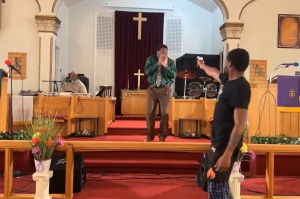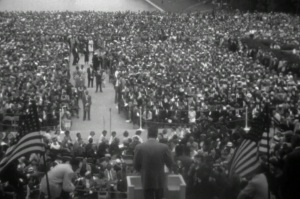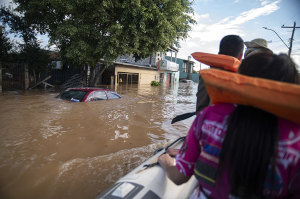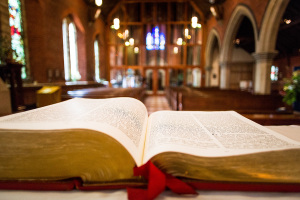Ukrainian bishop says Putin is the 'Antichrist of our current time': 'Against God’s law'
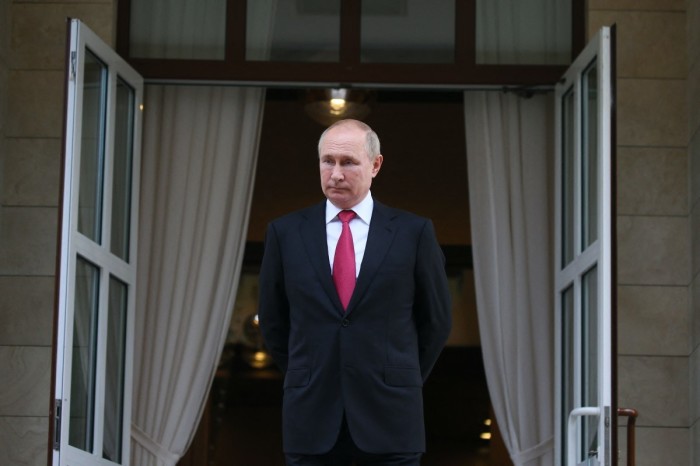
An Orthodox bishop in Ukraine has likened Russian President Vladimir Putin to the Antichrist as tensions between the two countries continue nearly a week after Russia began its invasion of Ukraine.
On BBC’s Global News Podcast Sunday, religion and ethics producer Harry Farley spoke with Ukrainian Bishop Yevstratiy Zoria, a spokesperson for the Orthodox Church of Ukraine, about Putin’s belief that Russia and Ukraine had a “shared spiritual space.”
“What he’s referring to is the arrival of the Eastern Orthodox Church to the region in the ninth century,” Farley said. “He along with many other Russians see Russia’s history dating back to that empire” that existed at the time.
“Moscow and the Russian Orthodox Church developed, became this huge power … within the Orthodox Church. But in 2019, the Ukrainian Orthodox Church split off from Russia and was recognized as independent,” Farley added. “Religion is hugely important for Putin’s identity, for his psyche, he immerses himself in icy water to mark the festival of Epiphany, he wears his baptismal cross.”
Farley surmised that Putin “sees himself as a kind of messianic figure, a savior, to reunite Eastern Orthodox churches under Moscow.”
After noting that the Ukrainian Orthodox Church is “fiercely independent” and “rejects Moscow’s authority,” Farley shared a soundbite from his interview with Zoria, who vehemently pushed back on the characterization of Putin as a messianic figure.
Zoria described the Russian President as “really not messianic, but really [the] Antichrist of our current time.”
Zoria told Farley that “he is [the] Antichrist because everything [that] he does … is totally against [the] Gospel, against God’s law.”
Farley elaborated on the religious background underlying the ongoing conflict between Russia and Ukraine.
“Religion is very important to Russians,” Farley said. “Seventy-one percent identify as Orthodox Christians and added into that, more than half of Russians say it is important for a person to be Orthodox Christian in order to be truly Russian.”
The BBC producer cited a “combination of [a] strong religious identity linked to strong national identity” and the fact that “the Russian Orthodox Church is very close to Vladimir Putin” as important factors influencing the geopolitics surrounding the invasion of Ukraine.
“The head of the Russian Orthodox Church … praised Putin just this week after the invasion,” he said.
In an op-ed published by The Gospel Coalition last week, Perry Glanzer, professor of educational foundations at Baylor University, asserted that “former communists largely control the Russian Orthodox Church, and they use this power to support a Russian version of Christian nationalism.”
Glanzer stressed that this makes “the church an instrument of the state.” The professor wrote that Russian politicians “undermine burgeoning efforts to rebuild civil society, improve religious liberty, or expand religious education.”
“The dominant Russian Orthodox Church makes things worse,” Glanzer stated.
Glanzer, who lived in Russia for two years and spent extended periods doing research in Ukraine, also outlined how the Russian government has persistently “made it difficult, and sometimes impossible, for Russian Christians to build institutions to further Christianity.”
He noted that Russia has “outlawed evangelism” and persecutes “Protestants as well as Russian Orthodox who press for moral reform.” He argued that the Russian government “killed” Russian American Christian University.
Glanzer recalled how Russian efforts to stamp out Christianity extended beyond its borders when “Russian mercenaries marched into Ukraine in 2017 and set up their headquarters” in Donetsk Theological Seminary “to expand Putin’s maniacal and deadly dreams.”
He contrasted the state of Christianity in Russia with the attitude towards Christianity in Ukraine, a former Soviet state where Catholicism was once outlawed.
“In contrast to Russian political leadership, prior to Russian interference Christian institutions had been thriving in Ukraine, a land that promoted religious freedom,” he proclaimed.
Glanzer pointed to the positive influence of Ukrainian Catholic University, the country’s first Catholic institution of higher education, as evidence that “civil society was beginning again” in Ukraine despite bearing the “scars of leadership under morally corrupt communists.”
Glanzer lamented that “Russians are on the hunt to kill signs of civil society and hope beyond their border.”
In a Zoom webinar hosted by the Philos Project Monday, Assistant Professor of Conflict Management Kristina Hook of Kennesaw State University elaborated on the recent religious history of Ukraine and how it plays a role in what is unfolding on the ground there.
“Prior to 2018, there were three types of Orthodox churches in Ukraine,” she said. “There was the Autocephalous Orthodox Church, there was the Kyiv Patriarchate Orthodox Church and there was the Moscow Patriarchate Orthodox Church.”
“When this split happened, the majority of those congregations moved into the Ukrainian Orthodox Church,” she added.
In previous conversations with priests affiliated with the aforementioned Ukrainian church branches, Hook discovered that their merger with the Ukrainian Orthodox Church “was because of things like accusations of the Russian government using monasteries in the Donbas region to smuggle weapons.”
Additionally, she cited “really personal reasons about priests not being allowed to do funeral rights for soldiers who were killed because the Moscow patriarchates … received its direction from the church in Russia.”
Hook praised “the new leader of the Ukrainian Orthodox Church,” who has been “calling very publicly for Ukrainians to be strong” while “reminding people not to do any property damage to any churches they associate with the Moscow tradition.”
Ryan Foley is a reporter for The Christian Post. He can be reached at: ryan.foley@christianpost.com
















